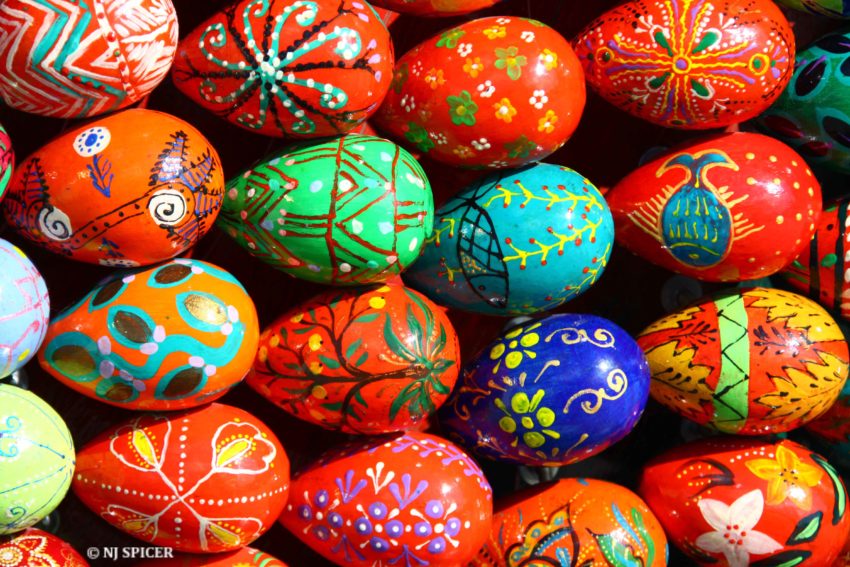 I was born and raised in Ukraine, and one of the sweetest memories about my childhood is our Easter celebration. Every year we gathered all together at my grandmother’s house. It was always like a family reunion since I only saw some of my relatives on Easter.This is my third Easter here in US, far away from my relatives. Fortunately, thanks to technologies, this year I still plan “to see” all my family together; this year most Ukrainians (around 70 % of Ukrainians are Orthodox Christians) celebrate Easter (Velykden – the Great Day) on April 16, the same date as Catholics do. This does not happen every year, as Orthodox Christians and Catholics follow different religious calendars.
I was born and raised in Ukraine, and one of the sweetest memories about my childhood is our Easter celebration. Every year we gathered all together at my grandmother’s house. It was always like a family reunion since I only saw some of my relatives on Easter.This is my third Easter here in US, far away from my relatives. Fortunately, thanks to technologies, this year I still plan “to see” all my family together; this year most Ukrainians (around 70 % of Ukrainians are Orthodox Christians) celebrate Easter (Velykden – the Great Day) on April 16, the same date as Catholics do. This does not happen every year, as Orthodox Christians and Catholics follow different religious calendars.
For Ukrainians, Easter is a main religious holiday. They start to prepare for it 40 days before the Easter itself. This period is called Great Easter Lent. People give up meat, eggs, butter and any other “animal” food and abstained from dancing, singing and other “fun” activities during this time. It is meant to be a season for praying, soul cleansing and penitence.
The most important time of the Great Lent is the whole week before Easter Sunday. Holy week, as it is usually called, begins with the Willow Sunday, the day when people bring willow branches to the church to celebrate Christ’s entry into Jerusalem. After the Willow Sunday services, Ukrainians bring these blessed willow branches home, gently tap each other with them, saying: “Be as big as the willow, healthy as water, rich as the earth.” Blessed willow branches are always kept in the house behind or above the holy pictures (“icony”) until the next Willow Sunday.
The next four days Ukrainians spend time cleaning their houses and preparing food for the Easter: dyeing eggs, baking Paska and cooking meat. Paska is a beautifully decorated Easter bread. Traditions state that the baker (usually a woman) starts the process with praying, she must keep her thoughts pure and the entire household quiet in order to ensure the bread bakes properly and becomes its fluffiest. Even no one, except the members of the family, are allowed inside the home during its baking.
On Good Friday, which is called Mourning Friday (“Strastna Piatnytsia”) in Ukraine, people continue fasting (almost no food), and attend morning and evening services at the church. On Saturday, Ukrainians finish their preparations, try to rest, so that they are able to spend the whole night service at the church. On Saturday evening, women in Ukraine start to prepare Easter baskets, they put Paska bread, dyed eggs (“krashanky”), salt, non-Lenten food like sausage and ham, and also a candle in the baskets. The Easter baskets are taken to the church where they are blessed by the priest as part of the overnight mass, and then taken home by the families to eat in the morning.
In Ukraine Easter is a very family-centered holiday, so on Easter morning, all the family gather together to have breakfast, starting with the common prayer. They then consume the blessed food from the Easter basket. The fun part of the holiday meal is “eggs battles” or “eggs knocking”: two people rap their eggs together, and if someone’s eggshell breaks, that person is out of the game. The winner is the one whose egg has the strongest eggshell. In Ukraine, Easter is celebrated for three days. People do not do any work, and instead go to church and visit their friends and family.
Victoriia Serediuk-Buz joined the MLJ Adoptions team as a legal intern in 2017. Originally from Ukraine, she has been a huge asset in assisting with the Ukraine Hosting Program.
Photo Credit: Neiljs
